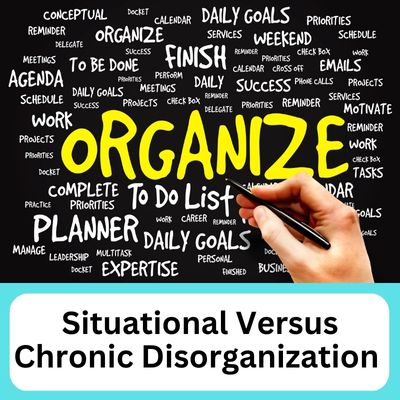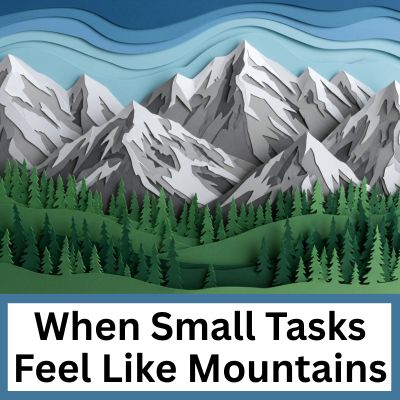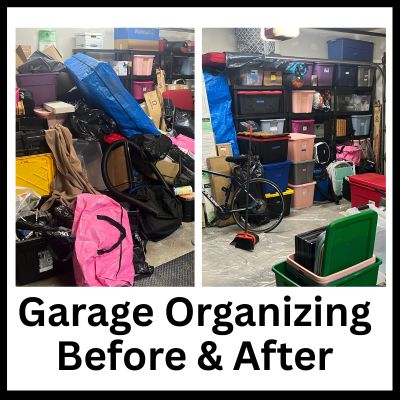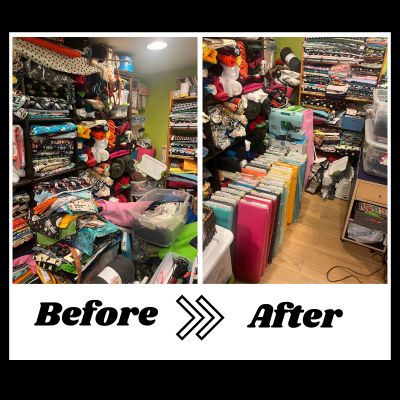Situational Versus Chronic Disorganization

In January, the New York Times, along with many other major news sources, is always filled with articles about how to get organized. Many people start the new year off with great ambition to get organized, once and for all. For people with ADHD, you know this routine all too well. “Will I ever be organized?” is a question you’ve asked yourself many times. Year after year, trying to get organized but never succeeding, can really start to weigh on your self-esteem. The main difference in why some people can get organized more easily than others is due to whether they are situationally disorganized or chronically disorganized. In this post, I’ll talk about why getting organized is harder for some people, and what to do about it.
Situational Disorganization
People who are situationally disorganized have a much easier time getting organized and staying organized. They may have become disorganized due to a move: changing cities, or just moving to a new part of town. People can become disorganized when they downsize: moving from a larger home into a smaller home or assisted living facility. A new addition to the household (a boyfriend/girlfriend, a baby, a pet, an elderly parent etc…) can be another reason why people get disorganized. New responsibilities at work, caring for an aging loved one, or a major schedule change can cause disorganization. Illness, injuries, or progressing mobility issues are another reason why people can get disorganized. Life changes such as a new job, marriage, or divorce, can also cause disorganization.
Chronic Disorganization
People who are chronically disorganized have tried repeatedly to get organized through self-help efforts, but have never been able to figure out how to get organized on their own. Usually people with chronic disorganization also have another issue such as ADHD, codependence, multiple sclerosis, traumatic brain injuries, obsessive compulsive disorder, addictions, hoarding disorder, depression, and/or anxiety disorders. If these issues aren’t being treated or managed properly, it’s going to be impossible for someone with chronic disorganization to get organized. The best they can hope for is to have someone who can come in and organize their stuff for them on a regular basis. But if someone with chronic disorganization is actively working on dealing with their other issue (and it hasn’t progressed enough to prevent someone from becoming organized on their own), and they are ready to get organized, they can make progress.
Why is it important to deal with these other issues in order to get organized?
If someone keeps trying to get organized, but has another untreated condition, it’s almost the equivalent to a hamster on a wheel. However, it is possible that getting organized may give someone the confidence to go out and get help with their other issue. It’s like the chicken and the egg scenario. Getting help getting organized is important, but getting help with the other issue is paramount. People with ADHD have trouble with using the part of the brain that is required for executive functions (working memory, motivation, focus, planning, organizing, emotional regulation, etc). These skills are required for being organized, so if that part of the brain is offline, or not firing as well as it could, it’s going to be really difficult to get organized. People with ADHD can also be major people pleasers! Putting other people’s need before their own can be difficult, and so they often have trouble creating boundaries that will allow them to tidy up their own house before caretaking for someone else. People with obsessive compulsive disorder or hoarding disorder may keep more than they realistically need of something. People with addiction may not have the time or energy to dedicate to getting organized. There are countless reasons why it’s important to deal with these other issues to really get organized.
What does dealing with the other issues look like?
First someone needs to identify that they have an issue and be ready to get help. No one else can make someone be ready to get help. They must want to do it on their own. Begging a shopping addict to stop is only going to make them want to shop more. But if they’ve hit rock bottom and are ready to make a change, they will find someone to help them. It’s like the quote: “when the student is ready, the teacher will appear.” There are lots of therapists, support groups, energy workers, doctors, and online resources to help people with all sorts of issues. Medication may be necessary (either short term or long term) to activate the part of the brain that is required to get organized and stay organized. Meditation has been proven to help people activate the part of the mind that is required for organization. Some people can do this without medication, but some need to have the medication so that they can meditate. I have heard of people who say they can’t meditate due to invasive thoughts and rumination, and so they don’t try. While it is important to be aware of things that cause rumination and avoid digging those neural pathways even deeper, there are techniques that can be used to get you out of your head and into your body. Hypnotherapy is another great solution to retrain your brain to get organized. If you’d like a referral for someone who can help you with your issue, please let me know. I have a long list of therapists, energy workers, hypnotherapists, doctors, naturopaths, and psychiatrists who can all help you deal with your other issues.
How can a professional organizer help?
If you have chronic disorganization and are interested in getting help, make sure your prospective organizer has experience with helping people with chronic disorganization like I do. A good professional organizer will bring in a fresh and optimistic energy to your home so that you can visualize your ability to get organized. While a professional organizer can’t prescribe medication or administer psychotherapy, they can help you find creative solutions for getting organized. Everyone has their own unique set of circumstances, skills, desires, and inventory in their home. The job of a professional organizer is not to force you to adhere to conventional organizing methods. Their job is to work collaboratively with you to help you find what will work so that you can manage your stuff on your own. A professional organizer can help you restructure your schedule so that you’re not biting off more than you can chew, and they can help you create habits so that you can get your things organized and maintain them regularly. While we can’t administer psychotherapy, we often have conversations about the emotional reasons why people can’t let go of their stuff. Professional organizers bring empathy to the equation, and clients can mirror the executive functioning skills of the of organizer. When asked, I love to help my clients create a spiritual practice so that they can get support getting organized on many different levels.
If you want help getting organized in 2023, I’d love to help you!

By Jean Prominski, Certified Professional Organizer
Check out my media exposure: Seattle Sparkle in the Media
Download my free 5 week journal The Seattle Sparkle Method to Get Organized and Stay Organized
Sign up for my free 4 Day Color to Declutter Challenge.
Become part of a like-minded community by joining my Facebook Group, Declutter and Organize with Seattle Sparkle.
Ready to book a consultation? Complete this form.
For artwork to energize your home, order through jeanprominski.com.




